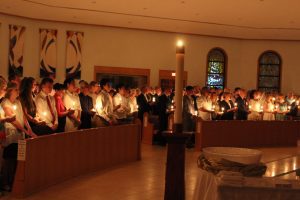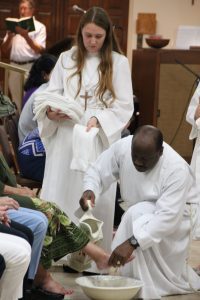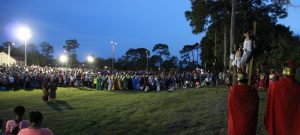By Bob Reddy – Florida Catholic
As the Lenten Season comes to a close we must now prepare for The Easter Triduum which bespeaks of mercy, because it renders visible the point that God’s love can reach.
Pope Francis describes Holy Thursday, Good Friday and Holy Saturday as enabling us to enter increasingly in the great mystery of our faith: the Resurrection of our Lord Jesus Christ.

The Holy Father said the “Mystery we adore in this Holy Week is a great story of love that knows no obstacles. Jesus’ Passion lasts until the end of the world, because it is a story of sharing with the sufferings of the whole of humanity and a permanent presence in the events of the personal life of each one of us. In sum, the Easter Triduum is the memorial of a drama of love that gives us the certainty that we will never be abandoned in life’s trials.”
Pope Francis also noted how each day of the Triduum represents God’s service, love, and silence, respectively, and that we, as His disciples, are called to live out these characteristics in our lives.
The Paschal Triduum begins at the conclusion of Lent, which ends at sunset on Holy Thursday. Triduum means “three days.” The Paschal Triduum is the three-day season counted sunset to sunset from Holy Thursday night to Easter Sunday evening. During these three days, we keep one festival – our Passover, our Easter. We join with all the people of faith and, in spirit, with all Christians in every time and place to fast, pray and keep watch. It is the Passover of the Lord!
The Church keeps the Paschal Fast from Good Friday through the Easter Vigil. Unlike the penitential fasting of Lent (now over), it is the fasting of joyful anticipation and anxious yearning for the Easter sacraments.

A very large part of being a Catholic Christian involves observing the Triduum each year. The Triduum is the center and summit of our liturgical year.
Holy Thursday is March 29 and celebrated as an evening Mass of the Lord’s Supper. One component often present in the liturgy is the Washing of the Feet, a profound sign of service to one another given to us by Jesus at the Last Supper. After hearing John’s Gospel, we reflect on Jesus’ call to all the faithful for service as we witness this ritual.
Traditionally, following the Holy Thursday liturgy, the Blessed Sacrament is removed from the Church to a place of repose and will remain there until the Easter Vigil. The faithful are invited to participate in Adoration of the Blessed Sacrament to a place where the Blessed Sacrament has been reposed.
Good Friday is March 30 and includes the celebration of the Lord’s Passion (with Veneration of the Cross and Communion). Many parishes in the Diocese will also hold Stations of the Cross and a prayer service with the “Seven Last Words.”
 The Good Friday Liturgy, is not a Mass, but is comprised of the celebration of the Lord’s Passion, Veneration of the Cross and reception of Eucharist. All are invited to come forward for the Veneration of the Cross. Veneration of the Cross is the climax of our response to the Passion. The faithful are called to behold Christ in his great act of love and we respond with loving veneration. For Christians, veneration of one cross, with the Body of Christ on it, means loving service to the cross and taking up one’s cross and following Christ crucified. Everyone is asked to leave this liturgy in silence.
The Good Friday Liturgy, is not a Mass, but is comprised of the celebration of the Lord’s Passion, Veneration of the Cross and reception of Eucharist. All are invited to come forward for the Veneration of the Cross. Veneration of the Cross is the climax of our response to the Passion. The faithful are called to behold Christ in his great act of love and we respond with loving veneration. For Christians, veneration of one cross, with the Body of Christ on it, means loving service to the cross and taking up one’s cross and following Christ crucified. Everyone is asked to leave this liturgy in silence.
On Holy Saturday, March 31, there are no Masses in the morning, however, Liturgy of the Hours and morning prayer are encouraged. In addition, many parishes will have a traditional blessing of Easter Baskets.
The Great Easter Vigil, the night before Easter Sunday, observes the most ancient tradition of the Church. The liturgy is begun in darkness, the Easter fire is kindled, the Paschal (Passover) Candle is lit and brought into the darkened church with the proclamation that Christ is our Light. During the liturgy, the faithful hear the story of our salvation proclaimed in numerous Scripture readings. Catechumens who have gone through the Rite of Christian Initiation for Adults will be baptized and confirmed, and everyone is asked to recall their own Baptismal commitments. The Mass is a celebration of the Risen Christ who is really and substantially present in the celebration of the Eucharist. This Great Vigil opens the Easter Season which will continue for 50 days and finds its conclusion on the Solemnity of Pentecost on May 20.
The conclusion of the Easter Triduum and the celebration of Easter is not confined to a single day, in fact, throughout the next 50 days the Easter Season is celebrated “in joyful exultation as one Feast Day, or better as one ‘great Sunday.’”
The first eight days after Easter make up, what is called the Octave of Easter, and is a festive time. On the 40th day of the Easter Season, Catholics celebrate the Ascension of the Lord (May 8, which this year is moved to the following Sunday on May 13), and in the days which follow, prepare for the coming of the Holy Spirit on Pentecost Sunday (May 20).





